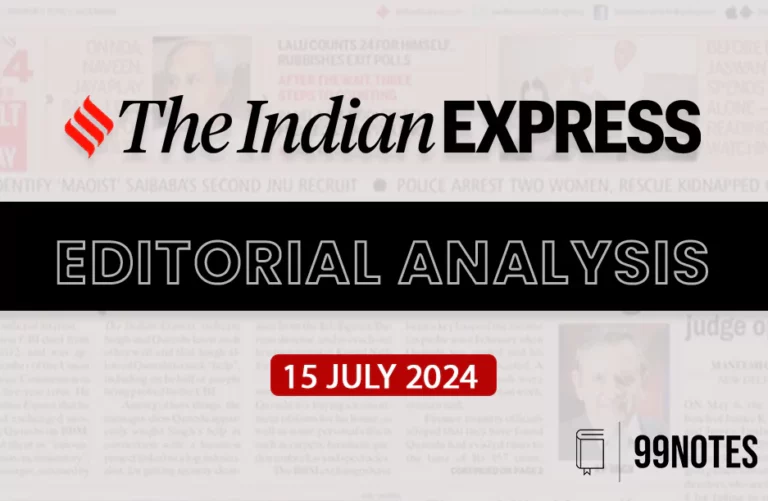6 August 2024 : Indian Express Editorial Analysis
1. Partners in food security
(Source: Indian Express; Section: The Ideas Page; Page: 11)
| Topic: GS3– Indian Economy |
| Context: |
|
About International Conference of Agricultural Economists
- The International Conference of Agricultural Economists (ICAE) is a prestigious event organized by the International Association of Agricultural Economists (IAAE).
- This conference gathers experts, researchers, policymakers, and practitioners from around the world to discuss critical issues and advancements in agricultural economics.
Purpose:
- The ICAE aims to facilitate the exchange of knowledge, ideas, and innovations in the field of agricultural economics.
- It addresses global challenges related to agriculture, food security, rural development, and sustainability.
Participants:
- The conference attracts a diverse group of attendees, including academics, researchers, government officials, industry professionals, and representatives from international organizations.
- It serves as a platform for networking and collaboration among these stakeholders.
Sessions and Topics:
- The ICAE features a wide range of sessions, including keynote addresses, plenary sessions, panel discussions, and paper presentations.
- Topics covered include agricultural policy, market dynamics, trade, environmental impacts, technological advancements, and rural development.
Global Impact:
- The conference plays a significant role in shaping agricultural policies and practices worldwide by providing evidence-based insights and recommendations.
- It promotes the application of economic principles to improve agricultural productivity, sustainability, and food security.
Frequency and Location:
- The ICAE is held every three years in different locations around the world, emphasizing its global scope and reach.
Introduction to the 32nd ICAE Conference in India
- India is hosting the 32nd International Conference of Agricultural Economists (ICAE) from August 2-7 in Delhi. Prime Minister Narendra Modi is the chief guest, and Agriculture Minister Shivraj Singh Chouhan is the guest of honour.
- This significant event marks a return to India for ICAE, which was last hosted in Mysore in 1958, with then Prime Minister Jawaharlal Nehru as the chief guest.
- Interestingly, ICAE has historical roots in India, with its founding president, Lord L.K. Elmhirst, having been inspired by a meeting with Rabindranath Tagore in 1921 to assist villages around Santiniketan.
Historical Context and Evolution of ICAE
- The International Conference of Agricultural Economists traces its origins back to a collaboration between Rabindranath Tagore and Lord L.K. Elmhirst in the early 20th century.
- Tagore’s concern for the disintegration of villages around Santiniketan led him to invite Elmhirst to India, where they worked together to establish a farm in Surul as a center for assisting nearby villages.
- This initiative laid the groundwork for what would become the ICAE, focusing on freeing villages from ignorance and weakness through scientific training and education.
Significance of ICAE in Addressing Global Food Security
- ICAE has grown into a major congregation of agricultural economists dedicated to addressing the world’s food and nutritional security challenges, which are exacerbated by climate change and geopolitical conflicts.
- India’s success in the Green Revolution and White Revolution (milk) highlights its potential role in addressing these issues.
- However, both India and Africa face ongoing challenges in ensuring nutritional security, especially for children under five.
- The conference provides a platform for India and Africa to share experiences and promote South-South collaboration to overcome these challenges.
Comparative Study of Indian and African Agricultural Economies
- A special session at the ICAE will compare the agricultural experiences of 20 major Indian states with those of 15 African countries from 2004-05 to 2019-20.
- The study reveals several key findings: high debt service ratios lead to lower agricultural spending relative to social protection; African countries consistently underfund agriculture compared to Indian states, hindering productivity and efforts to reduce child malnutrition; enhancing public spending on agricultural R&D and extension is crucial for both regions; reforming subsidies and reallocating resources to infrastructure and R&D can boost agricultural growth and improve child nutrition outcomes.
- These insights highlight the importance of agricultural investment in poverty reduction and economic growth.
Global Efforts and Challenges in Achieving Food Security
- At the global level, the fight against hunger faces significant human and financial costs due to conflicts, climate crises, economic slowdowns, and a lack of concerted global action.
- Achieving the United Nations’ goal of zero hunger by 2030 appears increasingly infeasible without substantial additional investments in agriculture and rural areas.
- A study by the University of Bonn (ZEF) and FAO estimates that $21 billion annually would be required to end global hunger by 2040.
- India’s leadership in the G20 has positively impacted the global agenda on food security, promoting a bioeconomy strategy and facilitating the African Union’s inclusion in the G20.
The Role of G20 and South-South Collaboration
- India’s facilitation of the African Union’s membership in the G20 and the focus on South-South collaboration are crucial steps in addressing food and nutritional security in the Global South.
- Developed countries in the G20 can aid in solving these issues by supporting climate resilience and sharing science and innovation for food systems transformation.
- The sequence of G20 presidencies from 2022 to 2025, including Indonesia, India, Brazil, and South Africa, indicates a shift towards a more inclusive governance of food systems, which is primarily in the interest of the Global South.
- The leadership of the Indian Prime Minister in this context aims to drive the agenda of the Global South within the G20, fostering strong agri-food relations between Africa and India for the common good of nearly one-third of humanity.
| Why is there a Need for Food Security in India? |
|
| Practice Question: Discuss the significance of the 32nd International Conference of Agricultural Economists (ICAE) being hosted by India in 2024, with a focus on the role of South-South collaboration and G20 initiatives. (250 words/15 m) |

